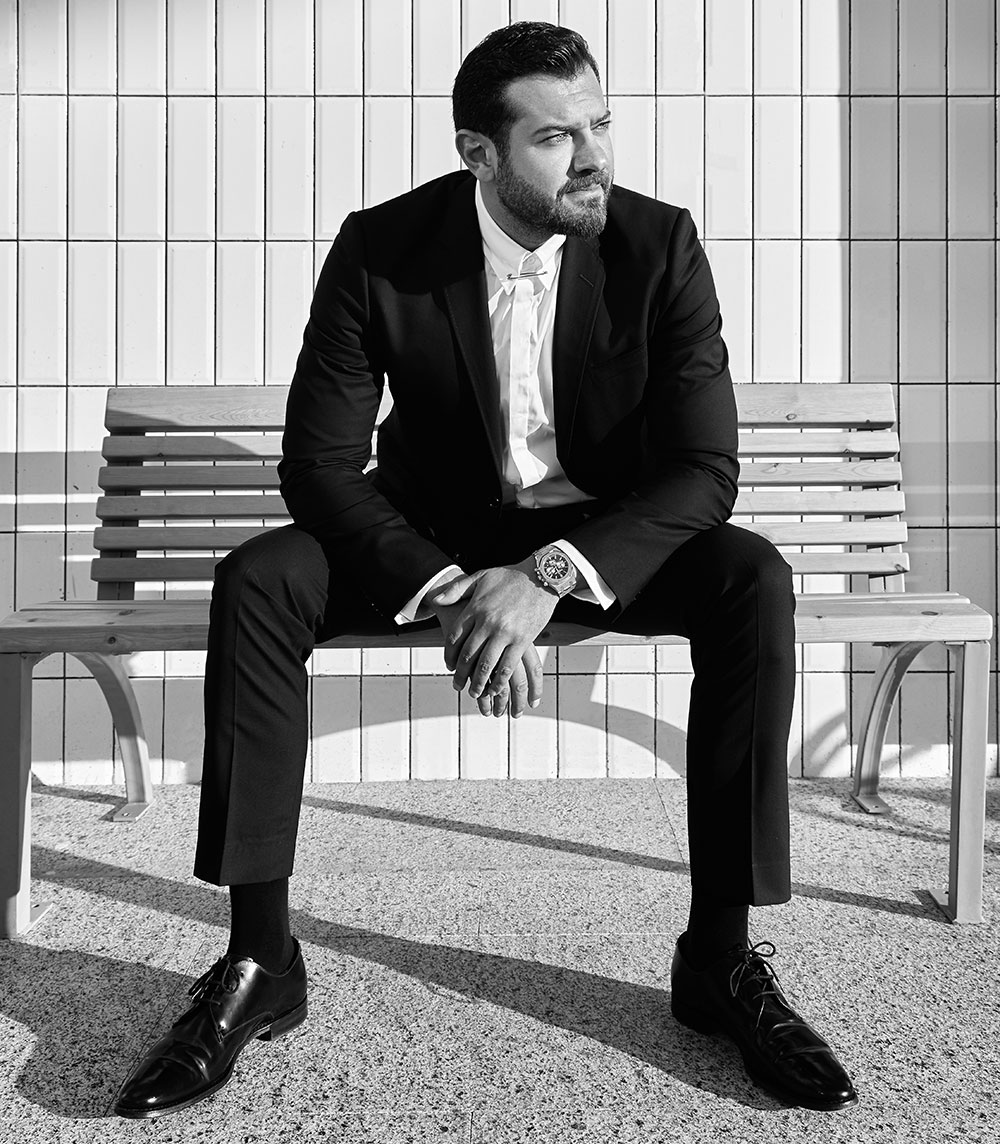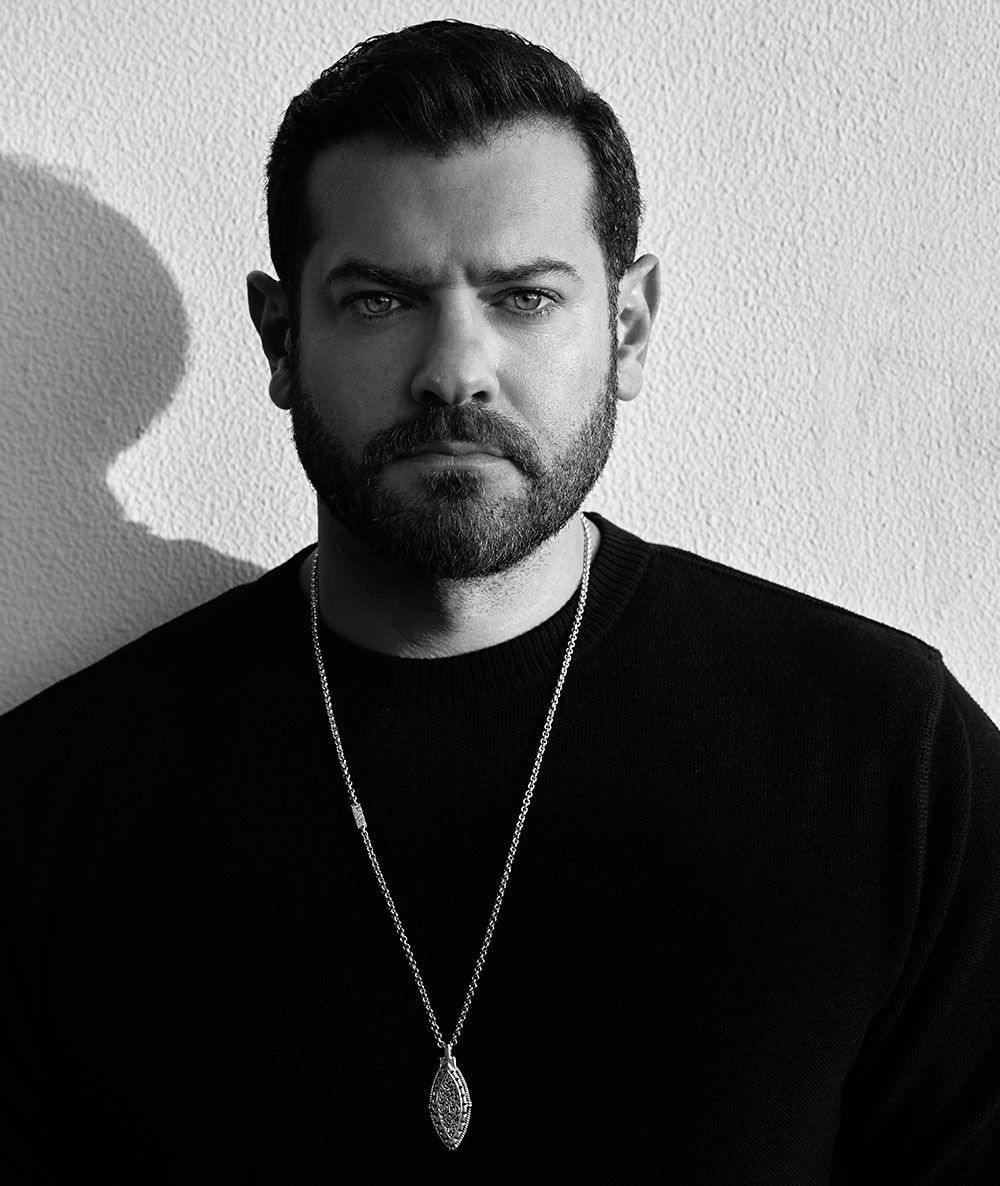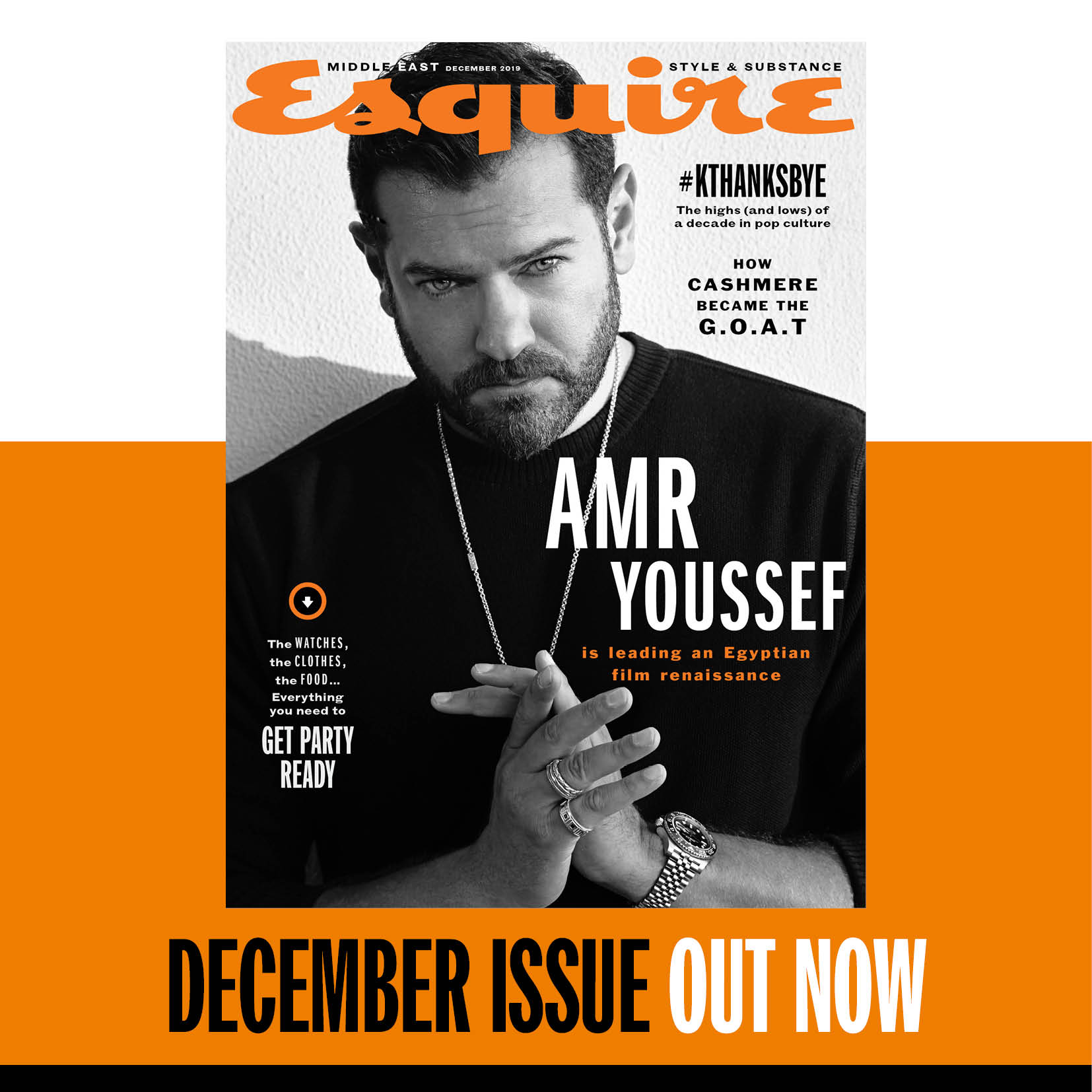“Much I loved the movies,” Amr Youssef recalls with almost boyish enthusiasm.
“I used to go to the cinema by myself when I was young. I took the little money I had and went to watch movies without calling any friends. I went to the cinema just to enjoy it. Sometimes I would watch three films in the same day—finishing one and going straight into another.”
If he was to do that today, one of the faces he’d likely be watching on screen would be his own.
The Egyptian actor is currently riding a wave of commercial success, one that has given him a place within an elite group of leading men capable of pulling people away from their phones and into cinemas.
At one stage during August, Sons of Rizk 2, the action thriller featuring Youseff and directed by Tarek Al Eryan, was the highest-earning movie per day in the history of Egyptian cinema. The blockbuster has now earnt more than US$6 million at the Egyptian box office alone and remains in the Top 10 more than three months after its initial release.

Suit, by Gucci @ Ego Store; Shirt, by Dsquared. Watch, Royal Oak self-winding chronograph, by Audemars Piguet @ Felopateer Palace
“I think people related to the characters in the first film, that’s what they were hoping to see a second,” says Youssef, who played one of four brothers trying to avoid a return to a life of crime. “They loved the characters, they loved the action, and that’s why it’s topped one hundred million pounds in Egypt. Now they are waiting for the third.”
When pressed on whether there will be a third he pauses for a second before replying without committal. “I’m not sure to be honest. It always depends on the script. If the writer comes up with a new script that we find challenging, we might do it. Otherwise we won’t.”
“If you’re not having fun, and if you’re not comfortable among your colleagues, it shows. The camera can see deep inside of you.”
It’s a refreshing answer considering the current state in Hollywood where seemingly sequels are triggered as soon as a film breaks even at the box office. But in his current purple patch, chasing sequels doesn’t seem to be a high on Youssef’s priority list.
“We had fun making [Sons of Rizk 2] and it shows,” he says despite the long shooting hours, and drawn out action sequences. “That element is really important when you do this kind of movie. If you’re not having fun, and if you’re not comfortable among your colleagues, it shows. The camera can see deep inside of you.”
 Youssef stars in gritty crime drama Sons of Rizk 2
Youssef stars in gritty crime drama Sons of Rizk 2
That’s where Youssef is now. After years of scrapping to break into the film industry, he is now reveling in the success that he has worked so hard to build. He has a string of hit films under his belt, has appeared in successful TV series such as the hugely popular Grand Hotel, and even married the Syrian actress Kinda Alloush. Not bad for a man who studied international law and began his career shooting TV commercials and music videos.
“This was always my dream,” he says. “While I was studying law I was trying to approach directors and to find acting roles and I knew that after I finished university I didn’t want to do anything related to what I’d studied. I just wanted to do what I had always dreamt of doing, so I started private acting classes for a couple of years.”
Having started from the bottom things Youssef was immediately at a disadvantage in terms of wasta, and industry contacts.
“I enjoy talking about films, even while I’m not shooting or working. I find myself more relaxed sitting with friends who are directors, or directors of photography, or actors.”
“I was very young and I didn’t know anyone in the industry at all. I didn’t know any producers, or directors, or even any actors,” he explains. “So I acted in commercials and while doing those my face started to become known and I started to get more connections with movie directors, because directors also make commercials for TV. So you get to meet them, you work with them, and you ask them for opportunities. You ask them for auditions.”
His big break came in 2007 when he was approached to appear in Al Daly opposite Nour El-Sherif. The series ran until 2011 and leading roles in shows such as the Ramadan drama Niran Sadeeka (Friendly Fire) and Tayea followed. Now Youssef is fully imbedded in the industry he always dreamt of being a part of.
“Sometimes I miss my old friends, my school friends, but the people I meet every day or when I am free are always people who work in the same field,” he says. “I enjoy talking about films, even while I’m not shooting or working. I find myself more relaxed sitting with friends who are directors, or directors of photography, or actors, because this job is always on your mind. It’s not a nine-to-five job. It’s full-time, even if you’re sitting at home alone. You’re always thinking.”
 Youssef and wife Syrian actress Kinda Alloush at the El Gouna Film Festival in Egypt
Youssef and wife Syrian actress Kinda Alloush at the El Gouna Film Festival in Egypt
The fact that Youssef puts a lot of stock in preparing for a role doesn’t come as a surprise, there is very little that he doesn’t do whole-heartedly.
“When you are preparing for a new role, it’s not about learning the lines. It’s about creating the characters. Because when you get a script and you first read it, the first thing you think about is not memorising the words, but how to create life from those words. How to create the character. How to make it flesh and blood. To make these lines on the paper become a real character. That is the hardest part.”
His most challenging role? “With most characters you face the same problem,” he replies. “But I did a movie three years ago that was based on a very successful novel called ‘Hepta’. Hepta means ‘seven’ in Greek and the novel talked about the seven levels of love. It’s hard when you are making a movie based on a bestselling novel because people who have read the novel always have an image of what the characters look like. So they are never satisfied with what you put on the screen.”
“When you’re young, people always tell you ‘ah, no way. There’s no way you’ll be able to do that’. It’s funny when people pull you back from something you dream about.”
Youssef has all the prerequisites of an onscreen lead. Handsome, with piercing blue eyes and a sometimes brooding intensity, he has an electric screen presence and has garnered admiration from both critics and audiences alike. He also has that boy next-door charm, producing the kind of character contradiction that has enabled him to straddle the divergent worlds of TV drama and action movies.
In conversation he is affable, revealing a fondness for cinema and a penchant for classic attire. His voice is relaxed, endearing even, and although he is busy with both family and work, he is amiable and open.
“Cinema was my passion. I always wanted to be a part of it. But you know, when you talk about stuff like that when you’re young, people always tell you ‘ah, no way. There’s no way you’ll be able to do that’. It’s funny when people pull you back from something you dream about, especially when it concerns acting or music. Any kind of art, really.”

Shirt and jeans, both by Dsquared @ Ego Store; Watch, World Time Chronograph by Patek Philippe @ Felopateer Palace
Egyptian cinema is a curiosity. The centre of film production in the Arab world, the Egyptian movie industry has captivated audiences for nearly a century. Its Golden Age, which lasted throughout much of the mid-20th century, made household names of stars such as Faten Hamama, Nadia Lutfi, Rushdy Abaza and Omar Sharif, and yet there has been a noticeable decline in the quality of films produced in the country over the course of the past 20 years. The industry is dominated by comedies and action thrillers, with blockbusters peddling violence and laughs at an increasingly frenetic rate.
There are exceptions, of course. Ahmad Abdalla’s Rags and Tatters, which was released in 2013, was a near-silent experimental masterpiece, while Mohamed Diab’s Clash opened the Cannes Film Festival’s ‘Un Certain Regard’ section in 2016. Both dealt with the country’s political turmoil. Just last year, Abu Bakr Shawky’s Yomeddine competed for the Palme d’Or at Cannes. Yet such films constitute a minority.
“Instead of paying 30 or 35 million Egyptian pounds to make a movie, now we can pay 50 million because we are getting more money from the cinemas. We can put more money into productions.”
Politics and economics have also not been kind to Egypt. Unstable conditions have negatively impacted film and TV production, with budgets cut and censorship a growing concern. “All filmmakers should have the freedom to talk about any subject they want to talk about, to show whatever they want to show, to say whatever they want to say,” insists Youssef.
Yet the industry has bounced back from the post-revolutionary and post-coup d’état doldrums, with Egyptian box office revenues on the rise. Youssef has been a part of that resurgence. The romantic comedy Hepta, in which he played a leading role, broke box office records for the genre, accumulating takings in excess of $3 million. The financial success of Sons of Rizk 2 has also proved there is big money to be made.

Sons of Rizk 2 has taken more than US$6 million at the local box office
“The economic status of Egypt is thriving,” says Youssef. “It’s moving to a better place. Sons of Rizk 2 has taken more than 100 million Egyptian pounds at the box office, and that’s only in Egypt. This is giving us more space to produce movies. Instead of paying 30 or 35 million Egyptian pounds to make a movie, now we can pay 50 million because we are getting more money from the cinemas. We can put more money into productions. They’re going to be better, they’re going to look better, and they’re going to compete better.”
Bigger money, bigger spectacle. That appears to be the current model. The costliest production in the history of Egyptian cinema, Sherif Arafa’s bombastic blockbuster Al Mamar (The Passage), was a major crowd pleaser following its release in June, despite accusations of outright propaganda. With a production bill just shy of $6 million, its elaborate action sequences brought a patriotically Egyptian slant to the aftermath of the Six-Day War and the subsequent War of Attrition.
“The distributors who take movies from Egypt and distribute them in the Arab world—in Kuwait or in the UAE—should also start distributing these movies, especially the well made ones, abroad.”
Earlier this year it was also announced that Egypt’s first ever 3D sci-fi film, 2050 Hesar Gohanam (2050 Hell Siege), was to be directed by Mohamed El Komy and star Hassan El Raddad and the Tunisian actress Dorra Zarrouk.
The country’s first-ever animated feature, AlAmira Wel Fares (The Knight and the Princess), also premiered at the El Gouna Film Festival in September.
Youssef, too, is preparing for something new. In January he will begin shooting The House of Shams, once again under the direction of Al Eryan. “I’ve been preparing for the past two months and it’s a new genre for Egyptian cinema.
It’s horror,” he says. “It’s going to be a new adventure. It’s going to be a bold new bet for Egyptian cinema.”
Horror as a genre has, or is, making something of a comeback in Egypt. The Blue Elephant 2—part thriller, part horror mystery—has taken more than $6.4 million at the box office this year, while Netflix’s third Arabic original series, Paranormal, is scheduled to go into production this month. Based on the books of Ahmed Khaled Tawfik, it is Netflix’s first foray into Egyptian drama.

Jumper, by Paul and Shark @ Ego store; Jewellery, by Azza Fahmy
Yet, despite increased investment and bigger box office returns, Egyptian films, by and large, don’t travel well. Unlike Lebanon, from where Nadine Labaki’s Capernaum and Ziad Doueiri’s The Insult have reached sizeable international audiences, the appeal of Egyptian films remains largely regional, with the obvious exception of films such as Clash and Yomeddine.
“This is changing,” says Youssef. “Tarek Al Eryan was in the States for two months recently and he met a lot of producers while he was there. Now he’s preparing to make a movie in the States because they were impressed with Sons of Rizk 2. But it’s not the director’s job to take his movie and show it to producers abroad. It’s the job of distributors. The distributors who take movies from Egypt and distribute them in the Arab world—in Kuwait or in the UAE—should also start distributing these movies, especially the well made ones, abroad. I don’t think they are doing a good job when it comes to distributing movies from this region.”
For now Youssef is delighting in the joys of fatherhood. His daughter, Hayat, has just turned one and his wife has taken a break from filming. He, too, only shot Sons of Rizk 2 this year. “I’m having a great time with my baby,” he says. “It has made me stay at home most of the time. I never used to stay at home that much, but now with my little baby in my life I’m there more and more.”
With 3.8 million Instagram followers, a growing appreciation of his work, and The House of Shams to begin shooting in January, this leading man better make the most of it. That family time will soon be interrupted.

Photography by Bilo Hussien // Production by Maison Mehany for Maison Mehany // Creative direction and styling by Anne Mehany // Art direction by Andrew Mehany // Assistant Art Director Youssef el Sayed // Location SODIC Real Estate


-1200x650.jpeg)
